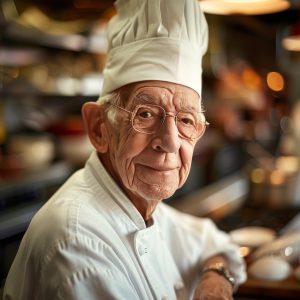Accelerated Culinary Arts Degree?
Accelerated culinary degrees offer a fast-track route for aspiring chefs and culinary professionals eager to jumpstart their careers. These programs condense comprehensive culinary education into a shorter time frame, allowing students to gain essential skills and knowledge without the extended commitment of traditional degree programs.
Ideal for those passionate about food and eager to enter the workforce quickly, accelerated culinary degrees provide a rigorous, hands-on learning experience covering cooking, kitchen management, and food safety fundamentals.
Students in accelerated programs often benefit from an intense, immersive curriculum emphasizing practical skills, ensuring they are well-prepared for the fast-paced culinary industry. From mastering essential techniques like knife skills and cooking methods to exploring diverse cuisines and contemporary culinary trends, these programs equip graduates with the expertise needed to excel in professional kitchens.
Beyond cooking, accelerated culinary degrees often include menu planning, nutrition, and cost control coursework, offering a well-rounded education that prepares students for various roles in the culinary world. Whether you aim to become a chef, caterer, or food entrepreneur, an accelerated culinary degree can be the springboard to achieving your culinary ambitions in record time.
What Is An Accelerated Culinary Arts Degree?
Accelerated culinary degrees are specialized educational programs designed to provide comprehensive culinary training in a shorter time frame than traditional culinary degree programs. These programs are ideal for individuals who want to quickly enter the culinary industry with the necessary skills and knowledge to succeed.
Critical features of accelerated culinary degrees include:
- Condensed Curriculum: The programs compress the standard curriculum into a more intensive schedule, often by extending class hours or offering courses year-round. This allows students to complete their education faster, typically in less than a year or around 12 to 18 months.
- Hands-On Training: Despite their shortened duration, these programs emphasize practical, hands-on experience. Students spend significant time in the kitchen, mastering essential cooking techniques, learning about various cuisines, and understanding kitchen operations.
- Focus on Core Competencies: Accelerated degrees concentrate on the fundamental skills needed for culinary success, such as knife skills, cooking methods, and food safety, while touching on other vital areas like menu planning, nutrition, and cost control.
- Diverse Career Pathways: Graduates of accelerated culinary programs are equipped to pursue various careers in the culinary industry, including roles as chefs, line cooks, caterers, or even food entrepreneurs.
These programs are perfect for motivated, disciplined individuals ready to transition quickly into the culinary workforce.
Advantages
An accelerated culinary degree offers several advantages, particularly for individuals eager to enter the culinary field quickly and efficiently. Here are some of the key benefits:
- Faster Entry into the Workforce: One of the most significant advantages of an accelerated culinary degree is the speed at which students can complete their education and start their careers. Instead of spending two to four years in a traditional program, students can often finish an accelerated program in 12 to 18 months, allowing them to begin working sooner.
- Intensive Learning Experience: Accelerated programs are designed to be immersive and focused. The condensed schedule means that students are often in the kitchen more frequently, gaining hands-on experience and practical skills in a concentrated time frame. This intense learning environment helps students quickly develop the competencies needed to excel in professional kitchens.
- Cost Efficiency: Because accelerated programs are shorter in duration, they can be more cost-effective. Students often pay less in tuition and related expenses than more extended programs, making it a financially appealing option for those seeking to minimize educational costs.
- Career Flexibility: Despite the shorter time frame, accelerated culinary degrees still provide a well-rounded education, covering essential topics like cooking techniques, kitchen management, and food safety. Graduates are prepared for various roles in the culinary industry, from line cook to chef, caterer, or food entrepreneur.
- Networking Opportunities: In many accelerated programs, the intensive coursework fosters close-knit relationships among students and instructors. This can lead to valuable networking opportunities within the culinary industry, which can be crucial for career advancement.
- Adaptability for Career Changers: Accelerated culinary degrees are beautiful for individuals looking to switch careers. The short duration and focused curriculum allow career changers to quickly acquire the skills they need to transition into the culinary field without spending years in school.
An accelerated culinary degree is an excellent option for those passionate, motivated, and eager to embark on a culinary career as quickly as possible.
Where to Go For An Accelerated Culinary Degree
An accelerated culinary degree is possible through various educational institutions that offer specialized programs designed to fast-track culinary training. Here are some familiar places where one can pursue an accelerated culinary degree:
- Culinary Schools: Many culinary schools offer accelerated programs tailored to individuals who want to quickly gain the skills needed for a culinary career. Institutions like the Culinary Institute of America (CIA), Le Cordon Bleu, and Johnson & Wales University often provide fast-track options in addition to traditional programs.
- Community Colleges: Some colleges offer accelerated culinary degrees or certificates that can be completed quickly. These programs are often more affordable and accessible, making them a popular choice for students looking to enter the culinary field quickly.
- Vocational and Technical Schools: Vocational and technical schools frequently offer accelerated culinary programs to prepare students for immediate entry into the workforce. These schools focus on practical, hands-on training that is highly relevant to the demands of the culinary industry.
- Online Culinary Schools: Some online culinary schools offer accelerated programs for those who need more flexibility. While the hands-on experience might be limited, these programs often include virtual kitchen labs, video demonstrations, and intensive coursework that can be completed at an accelerated pace.
- Private Culinary Institutes: Some private culinary institutes and academies offer specialized accelerated programs. These institutions often partner with restaurants and industry professionals, providing students valuable internship opportunities and real-world experience.
- Apprenticeship Programs: Although not a traditional degree, some culinary apprenticeship programs are designed to be fast-tracked, allowing individuals to learn on the job while completing their education. Industry organizations or specific restaurants typically offer these programs, which may be a quicker path to gaining professional skills.
Before enrolling, it’s essential to research the specific program’s curriculum, accreditation, and industry reputation to ensure it aligns with your career goals and provides the quality education needed to succeed in the culinary field.











